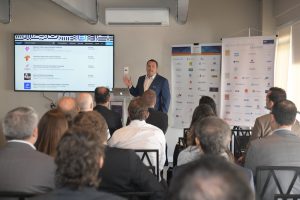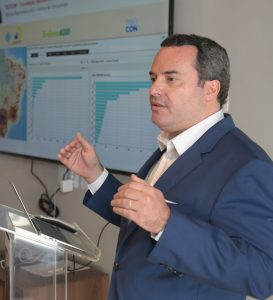
From the left: Cesar Garrubo (Honorary Consul of Norway), Jonas Lindström (Swedcham), Glorisabel Garrido Thompson-Flôres (NBCC), the speaker Alexandre Zavaglia, Juliana Meyer Gottardi (NBCC), Peter Johanson (Vice-Consul of Sweden), Renato Pacheco (Honorary Consul of Sweden) e Marcio Gerbovic (Finncham).
An event on artificial intelligence was organized by NBCC, Swedcham and Finncham in São Paulo in May.
 The same technology that is being used in digital marketing, transforming all sectors into data-driven environments, is also being applied in the area of law.
The same technology that is being used in digital marketing, transforming all sectors into data-driven environments, is also being applied in the area of law.
The number of lawsuits in Brazil is huge, representing a big challenge to society and to the authorities. The historical lack of digitalization of lawsuits and ongoing processes has made it almost impossible to study them and their outcome, and there is currently a lack of exact knowledge that could have guided businesses when developing strategies to prevent lawsuits or strategies for mediation and conciliation in the case of a conflict.
80 percent of all the data that is produced around the world, is considered unstructured, and using new technology, like the use of «electronic law processes» in Brazil, allows for the extraction and organization of data, also in the legal field.
«The digital processes and the publication of legal decisions in our country has created a favorable scenario to improve the situation, but standardization is still needed in order to conduct closer studies on the available data», Mr. Zavaglia said.
 The reduction of cost of data storage has also been fundamental in the ongoing process, allowing for more data to be converte into «computational language».
The reduction of cost of data storage has also been fundamental in the ongoing process, allowing for more data to be converte into «computational language».
«We are already developing innovative projects capable of improving the management and the work of the legal departments of companies and law firms. Researching the topics that generate the greatest number of conflicts, in the area of health or consumer law, in the application of the new legislation, or in the a criminal case, we collaborate with increasingly rapid and assertive answers. This technology is revolutionizing the provision of legal services, impacting on all business and market environments», Mr. Zavaglia said in his presentation to the event.
New technology and digitalization of data are becoming tools that contribute to increasing the strategic importance of the legal departments of the companies. Legal departments are no longer associated with problems and costs, but becoming an asset to the company, in order to improve procedures and avoid legal problems.

Keynote speaker Alexandre Zavaglia.
«But there is still a relevant learning curve on the use of big data and artificial intelligence. We must understand what problems we want to solve, and then to seek the most appropriate tools. The first step is to organize the internal data to identify the main topics and processes, enabling a closer analysis of the data. You also need to demystify these issues and understand that robots will always be more efficient at reading thousands of documents, organizing and sorting information, but only if they are programmed for that purpose. None of this is possible without people trained to do the work.»
Mr. Zavaglia emphasized the importance of training legal professionals in data use and analysis.
«Digitalization can contribute to service optimization and decision support. The increasing use of data science will have a great impacts on the strategic management of companies, their relationship with their shareholders, customers and suppliers. And that creates new job opportunities because, even with all these advances, people continue to make a difference», Alexandre Zavaglia concludes.
Alexandre Zavaglia Coelho has specialized in data science and is the Executive Director of Instituto de Direito Público de São Paulo – IDP/SP. He is also a director of education at Future Law.
:

